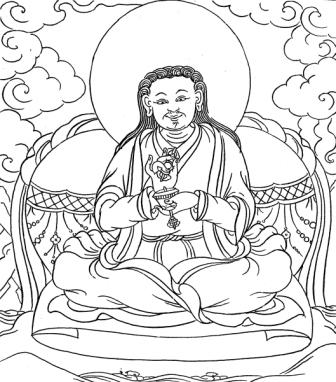Difference between revisions of "Rongzom Chokyi Zangpo"
Bj Lhundrup (talk | contribs) |
|||
| (45 intermediate revisions by 8 users not shown) | |||
| Line 1: | Line 1: | ||
| − | ''' | + | ===Short Biography=== |
| − | + | '''Rongzom Chokyi Zangpo''' (Tib: rong zom chos kyi bzang po), also known as '''Rongzom Mahapandita''' (11-12th century) | |
| − | + | [[Image:Rongzompa.jpg|frame|Rongzom Mahapandita Dharmabhadra]] | |
| − | + | Rongzom is widely acknowledged as one of the greatest and most influential masters of the Tibetan Buddhism. Along with [[Longchenpa|Longchen Rabjam]], he is often cited as one of the two "omniscient ones" of the [[Nyingma|Ancient Translation School]], the [[Nyingma|Ngagyur Nyingma]] ([[snga 'gyur rnying ma]]). Said to be the reincarnation of an Indian pandita named Smrtijnanakirti, Rongzom was renowned for his mastery of the Sanskrit language. He is also said to have had an unparralleled understanding of the Buddhist doctrine, and of the Nyingma teachings in particular. The master and historian [[Go Lotsawa]] said of Rongzom that no scholar in Tibet is his equal. | |
| − | |||
| − | |||
| − | He | ||
| − | |||
| − | |||
| − | |||
| − | |||
| − | |||
| − | |||
===Literary Works=== | ===Literary Works=== | ||
| − | See '''[[Writings of | + | See '''[[Writings of Rongzom]]'''<br> |
| − | + | *[[gsang sngags rdo rje theg pa'i tshul las snang ba ltar bsgrub pa]] | |
| + | **[[Establishing Appearances as Divine]] Rongzom Chokyi Zangpo on Reasoning, Madhyamaka, and Purity | ||
===Main Teachers=== | ===Main Teachers=== | ||
| − | * | + | *Doton Senge<br> |
| − | * | + | *Garton Tsultrim Sangpo<br> |
===Main Students=== | ===Main Students=== | ||
| − | * | + | *His sons: Zijibar and Bumbar<br> |
| − | * | + | *Korup Lotsawa<br> |
| − | * | + | *Marpa Topa<br> |
| − | * | + | *Khukpa Letse<br> |
| − | |||
| − | |||
| − | |||
===Alternate Names=== | ===Alternate Names=== | ||
| − | *[[ | + | *[[Rongzom Mahapandita]]<br> |
| − | *[[ | + | *[[rong zom]]; [[Rongzom]]<br> |
| + | *[[rong zom chos kyi bzang po]]<br> | ||
| + | *[[Dharmabhadra]] | ||
| + | ===Other Reference Sources=== | ||
| + | Information on the life and works of Rongzom can be found in Dudjom's ''[[The Nyingma School of Tibetan Buddhism]]'' and Petit's ''[[Beacon of Certainty]]''. | ||
| + | ===Internal Links=== | ||
| + | *Add double-brackets "[[ ]]" around any relevant word or phrase and it will create a new page for that term or link to an already existing page | ||
| − | === | + | ===External Links=== |
| − | + | *[http://www.tbrc.org ADD TBRC link here] | |
| + | [[Category:Buddhist Masters]] | ||
[[Category:Nyingma Masters]] | [[Category:Nyingma Masters]] | ||
Latest revision as of 16:53, 10 November 2011
Short Biography[edit]
Rongzom Chokyi Zangpo (Tib: rong zom chos kyi bzang po), also known as Rongzom Mahapandita (11-12th century)
Rongzom is widely acknowledged as one of the greatest and most influential masters of the Tibetan Buddhism. Along with Longchen Rabjam, he is often cited as one of the two "omniscient ones" of the Ancient Translation School, the Ngagyur Nyingma (snga 'gyur rnying ma). Said to be the reincarnation of an Indian pandita named Smrtijnanakirti, Rongzom was renowned for his mastery of the Sanskrit language. He is also said to have had an unparralleled understanding of the Buddhist doctrine, and of the Nyingma teachings in particular. The master and historian Go Lotsawa said of Rongzom that no scholar in Tibet is his equal.
Literary Works[edit]
- gsang sngags rdo rje theg pa'i tshul las snang ba ltar bsgrub pa
- Establishing Appearances as Divine Rongzom Chokyi Zangpo on Reasoning, Madhyamaka, and Purity
Main Teachers[edit]
- Doton Senge
- Garton Tsultrim Sangpo
Main Students[edit]
- His sons: Zijibar and Bumbar
- Korup Lotsawa
- Marpa Topa
- Khukpa Letse
Alternate Names[edit]
Other Reference Sources[edit]
Information on the life and works of Rongzom can be found in Dudjom's The Nyingma School of Tibetan Buddhism and Petit's Beacon of Certainty.
Internal Links[edit]
- Add double-brackets "[[ ]]" around any relevant word or phrase and it will create a new page for that term or link to an already existing page
